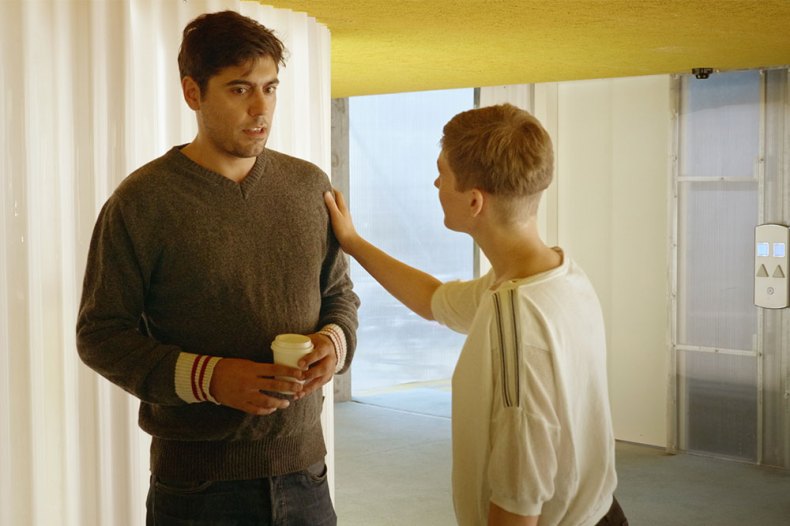Upstairs at the Goldsmiths Centre for Contemporary Art in London is a drab white room containing two screens, a sofa and a white table. Part of Pilvi Takala’s show, ‘On Discomfort’, these screens are playing The Trainee (2008). On one, the Finnish artist rides up and down in an elevator, all day, in the Helsinki offices of the accountancy firm Deloitte. A hidden camera, about chest level, focuses on the reactions of her colleagues, who seem to regard her with a mixture of apprehension and amusement. On the other is a powerpoint presentation composed of photos of Takala in an office: we see her sit at an empty desk and stare into space, a method she describes as ‘brainwork’ to passing colleagues.
The result is unsettling and oddly funny, but it also induces a sense of envy in the viewer. Who hasn’t sat behind a desk all day, wondering how little work one could do and not arouse any suspicion? On this count, Takala deliberately fails. Emails from her colleagues flash up on the screen, some saying she’s weird, funny but also ‘scary to some extent’, others asking if she has ‘mental problems’.
Still from The Trainee (2008), Pilvi Takala. Courtesy the artist

Much of Takala’s work explores the rituals and unspoken codes that govern institutions. She infiltrates a range of ‘organisations’ – from a singles’ dance class for the elderly in Estonia to an online messaging service in the United States where users pay to have a pretend girlfriend or boyfriend text them. In Snow White (2009), the artist wears an adult Snow White costume to Euro Disney and is stopped from entering by a security guard who explains the children may confuse her for the real character. ‘I thought the real Snow White was a drawing?’, she replies. In The Stroker (2018), you can’t look away as Takala walks through the space of Second Home, a co-working space in east London. She is moonlighting as Nina, a ‘stroker’ from a fictional wellness company who walks around gently touching people on the arm or shoulder. It’s the only work in which Takala uses actors rather than real people, allowing her to draw out interactions for a second longer than is necessary. The film is shot from above to show how people contort to avoid her contact.
Still from The Stroker (2018), Pilvi Takala. Courtesy the artist

In the basement of the gallery is Close Watch (2022), an uneasy, measured installation hidden behind a long wall of one-way mirrors, mimicking a control room. In 2021, Takala worked in a Finnish mall as a guard for Securitas, a private security firm. Two days before her stint is up, her colleagues Google her. Shortly after, Takala invites them to take part in a filmed workshop based on Forum Theatre, where they role-play interactions with customers. Takala’s ‘just asking questions’ demeanour, along with her placid open expression, pushes the workshop in unnerving directions. We see the participants move through the fraught spaces of what one can and can’t say – about, for example, bad behaviour and racist jokes, with a frankness that is disarming.
Although Takala employs the same tactics across her work – waiting for people to make the first move, inserting herself into the margins of an institution – they never become predictable. The exhibition guide likens them to what sociologists call ‘breaching’ – changing the rules of a situation to see what the limits are – and the results are entertaining and cringe-inducing. As her work lingers on feelings that most of us try to avoid, it becomes clear that Takala is less interested in resolving the situations in which she puts herself than in ridiculing life’s banal formalities.
‘Pilvi Takala: On Discomfort’ is at Goldsmiths CCA, London, until 4 June.



